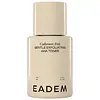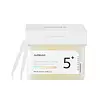What's inside
What's inside
 Key Ingredients
Key Ingredients

 Benefits
Benefits

 Concerns
Concerns

 Ingredients Side-by-side
Ingredients Side-by-side

Water
Skin ConditioningPropanediol
SolventGluconolactone
Skin ConditioningCaprylic/Capric Triglyceride
MaskingLactic Acid
BufferingTranexamic Acid
AstringentSodium Hydroxide
BufferingPrunus Amygdalus Dulcis Oil
Skin ConditioningBetaine
HumectantColloidal Oatmeal
AbsorbentOryza Sativa Bran Water
MaskingTocopherol
AntioxidantSphingomonas Ferment Extract
Skin ConditioningPanthenol
Skin ConditioningLeuconostoc/Radish Root Ferment Filtrate
AntimicrobialAzelaic Acid
BufferingHydrogenated Lecithin
EmulsifyingSodium Citrate
BufferingEthylhexylglycerin
Skin ConditioningPolyglyceryl-10 Stearate
Skin ConditioningCitric Acid
BufferingTrisodium Ethylenediamine Disuccinate
Phenoxyethanol
PreservativeWater, Propanediol, Gluconolactone, Caprylic/Capric Triglyceride, Lactic Acid, Tranexamic Acid, Sodium Hydroxide, Prunus Amygdalus Dulcis Oil, Betaine, Colloidal Oatmeal, Oryza Sativa Bran Water, Tocopherol, Sphingomonas Ferment Extract, Panthenol, Leuconostoc/Radish Root Ferment Filtrate, Azelaic Acid, Hydrogenated Lecithin, Sodium Citrate, Ethylhexylglycerin, Polyglyceryl-10 Stearate, Citric Acid, Trisodium Ethylenediamine Disuccinate, Phenoxyethanol
Water
Skin ConditioningNiacinamide
SmoothingDipropylene Glycol
HumectantGlycerin
HumectantPropanediol
SolventButylene Glycol
HumectantHydroxyethyl Urea
HumectantDiethoxyethyl Succinate
SolventHydroxyacetophenone
AntioxidantCaprylyl Glycol
EmollientPolyglyceryl-10 Laurate
Skin ConditioningBetaine
HumectantPanthenol
Skin ConditioningEthylhexylglycerin
Skin ConditioningGluconolactone
Skin ConditioningSodium Polyacrylate
AbsorbentAmmonium Acryloyldimethyltaurate/Vp Copolymer
Sodium Citrate
BufferingCitric Acid
BufferingMaltodextrin
Absorbent1,2-Hexanediol
Skin ConditioningGardenia Florida Fruit Extract
Skin ConditioningDipotassium Glycyrrhizate
HumectantSodium Hyaluronate
HumectantAscorbic Acid
AntioxidantPantolactone
HumectantTocopherol
AntioxidantCapryloyl Salicylic Acid
ExfoliatingTranexamic Acid
AstringentTremella Fuciformis Extract
HumectantCaprylic/Capric Triglyceride
MaskingAscorbyl Glucoside
AntioxidantUbiquinone
AntioxidantHydrogenated Lecithin
EmulsifyingMagnesium Chloride
Alcohol
AntimicrobialGlutathione
Polysorbate 80
EmulsifyingCalcium Gluconate
HumectantPyridoxine Hcl
Skin ConditioningBHT
AntioxidantYeast Extract
Skin ConditioningCyanocobalamin
Skin ConditioningDisodium EDTA
Water, Niacinamide, Dipropylene Glycol, Glycerin, Propanediol, Butylene Glycol, Hydroxyethyl Urea, Diethoxyethyl Succinate, Hydroxyacetophenone, Caprylyl Glycol, Polyglyceryl-10 Laurate, Betaine, Panthenol, Ethylhexylglycerin, Gluconolactone, Sodium Polyacrylate, Ammonium Acryloyldimethyltaurate/Vp Copolymer, Sodium Citrate, Citric Acid, Maltodextrin, 1,2-Hexanediol, Gardenia Florida Fruit Extract, Dipotassium Glycyrrhizate, Sodium Hyaluronate, Ascorbic Acid, Pantolactone, Tocopherol, Capryloyl Salicylic Acid, Tranexamic Acid, Tremella Fuciformis Extract, Caprylic/Capric Triglyceride, Ascorbyl Glucoside, Ubiquinone, Hydrogenated Lecithin, Magnesium Chloride, Alcohol, Glutathione, Polysorbate 80, Calcium Gluconate, Pyridoxine Hcl, BHT, Yeast Extract, Cyanocobalamin, Disodium EDTA
 Reviews
Reviews

Ingredients Explained
These ingredients are found in both products.
Ingredients higher up in an ingredient list are typically present in a larger amount.
Betaine is a common humectant (a substance that promotes retention of moisture). It's known to be gentle on the skin and can help balance hydration.
This ingredient is best for improving hydration and soothing irritated skin. Studies also show it helps even out skin tone.
Fun fact: Betaine is naturally created in the skin and body. The kind found within cosmetic products can be either plant-derived or synthetic.
Another name for betaine is trimethylglycine.
Learn more about BetaineThis ingredient is an emollient, solvent, and texture enhancer. It is considered a skin-softener by helping the skin prevent moisture loss.
It helps thicken a product's formula and makes it easier to spread by dissolving clumping compounds.
Caprylic Triglyceride is made by combining glycerin with coconut oil, forming a clear liquid.
While there is an assumption Caprylic Triglyceride can clog pores due to it being derived from coconut oil, there is no research supporting this.
Learn more about Caprylic/Capric TriglycerideCitric Acid is an alpha hydroxy acid (AHA) naturally found in citrus fruits like oranges, lemons, and limes.
Like other AHAs, citric acid can exfoliate skin by breaking down the bonds that hold dead skin cells together. This helps reveal smoother and brighter skin underneath.
However, this exfoliating effect only happens at high concentrations (20%) which can be hard to find in cosmetic products.
Due to this, citric acid is usually included in small amounts as a pH adjuster. This helps keep products slightly more acidic and compatible with skin's natural pH.
In skincare formulas, citric acid can:
While it can provide some skin benefits, research shows lactic acid and glycolic acid are generally more effective and less irritating exfoliants.
Most citric acid used in skincare today is made by fermenting sugars (usually from molasses). This synthetic version is identical to the natural citrus form but easier to stabilize and use in formulations.
Read more about some other popular AHA's here:
Learn more about Citric AcidEthylhexylglycerin (we can't pronounce this either) is commonly used as a preservative and skin softener. It is derived from glyceryl.
You might see Ethylhexylglycerin often paired with other preservatives such as phenoxyethanol. Ethylhexylglycerin has been found to increase the effectiveness of these other preservatives.
Gluconolactone is a PHA. PHAs are a great gentle alternative to traditional AHAs.
When applied, Gluconolactone has the same affect on skin as AHAs such as lactic acid. It helps dissolve the dead skin cells in the top layer of your skin. This improves texture and brightens the skin.
PHAs are more gentle than AHAs due to their larger structure. They do not penetrate as deeply as AHAs and take a longer time to dissolve dead cells. Studies show PHAs do not cause as much irritation.
Gluconolactone has some interesting properties:
In a 2004 study, Gluconolactone was found to prevent UV damage in mouse skin cells and has not been found to increase sun sensitivity. However, we still recommend wearing SPF daily.
This ingredient is is an created by reacting gluconic acid with an alcohol.
Learn more about GluconolactoneHydrogenated Lecithin is created from the hydrogenation of lecithin (a group of phospholipids). Hydrogenation is a chemical reaction between hydrogen and another element.
This ingredient is an emollient and emulsifier. As an emollient, it helps soften skin by trapping moisture within. As an emulsifier, it prevents oil and water ingredients from separating.
Panthenol is a common ingredient that helps hydrate and soothe the skin. It is found naturally in our skin and hair.
There are two forms of panthenol: D and L.
D-panthenol is also known as dexpanthenol. Most cosmetics use dexpanthenol or a mixture of D and L-panthenol.
Panthenol is famous due to its ability to go deeper into the skin's layers. Using this ingredient has numerous pros (and no cons):
Like hyaluronic acid, panthenol is a humectant. Humectants are able to bind and hold large amounts of water to keep skin hydrated.
This ingredient works well for wound healing. It works by increasing tissue in the wound and helps close open wounds.
Once oxidized, panthenol converts to pantothenic acid. Panthothenic acid is found in all living cells.
This ingredient is also referred to as pro-vitamin B5.
Learn more about PanthenolPropanediol is an all-star ingredient. It softens, hydrates, and smooths the skin.
It’s often used to:
Propanediol is not likely to cause sensitivity and considered safe to use. It is derived from corn or petroleum with a clear color and no scent.
Learn more about PropanediolSodium Citrate is the sodium salts of citric acid. In skincare, it is used to alter pH levels and acts as a preservative.
Its main functions are to maintain the pH of a product and neutralize metal ions.
The acidity of our skin is maintained by our glands and skin biome; normal pH level of skin is slightly acidic (~4.75-5.5).
Being slightly acidic allows our skin to create an "acid mantle". This acid mantle is a thin barrier that protects our skin from bacteria and contaminants.
Learn more about Sodium CitrateTocopherol (also known as Vitamin E) is a common antioxidant used to help protect the skin from free-radicals and strengthen the skin barrier. It's also fat soluble - this means our skin is great at absorbing it.
Vitamin E also helps keep your natural skin lipids healthy. Your lipid skin barrier naturally consists of lipids, ceramides, and fatty acids. Vitamin E offers extra protection for your skin’s lipid barrier, keeping your skin healthy and nourished.
Another benefit is a bit of UV protection. Vitamin E helps reduce the damage caused by UVB rays. (It should not replace your sunscreen). Combining it with Vitamin C can decrease sunburned cells and hyperpigmentation after UV exposure.
You might have noticed Vitamin E + C often paired together. This is because it is great at stabilizing Vitamin C. Using the two together helps increase the effectiveness of both ingredients.
There are often claims that Vitamin E can reduce/prevent scarring, but these claims haven't been confirmed by scientific research.
Learn more about TocopherolTranexamic Acid is best used for treating hyperpigmentation, discoloration, and melasma. It can also help build a stronger skin barrier.
Once applied, Tranexamic Acid starts decreasing inflammation from UV exposure. Tranexamic Acid also prevents our skin cells from meeting the pigment production cells.
Its brightening property makes it great at reducing the appearance of acne scars and marks.
Fun fact: Tranexamic Acid is also a medication used to reduce heavy bleeding.
This acid is derived from lysine, an amino acid.
Learn more about Tranexamic AcidWater. It's the most common cosmetic ingredient of all. You'll usually see it at the top of ingredient lists, meaning that it makes up the largest part of the product.
So why is it so popular? Water most often acts as a solvent - this means that it helps dissolve other ingredients into the formulation.
You'll also recognize water as that liquid we all need to stay alive. If you see this, drink a glass of water. Stay hydrated!
Learn more about Water